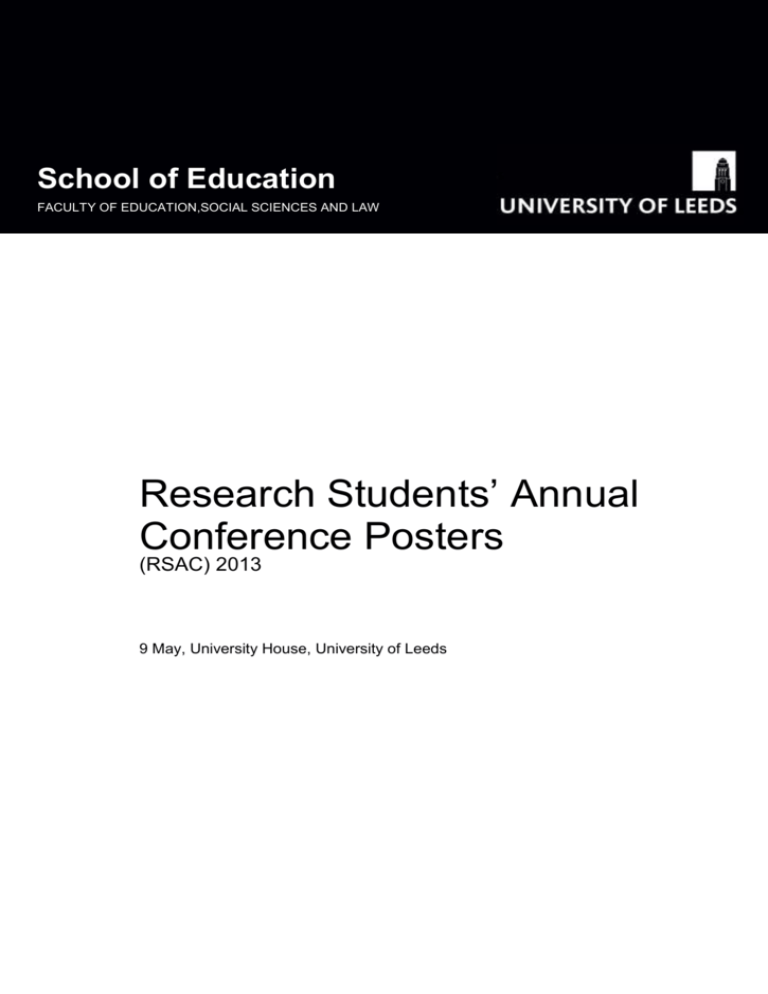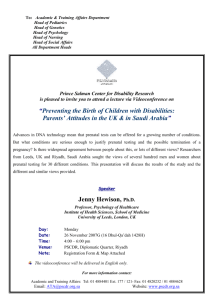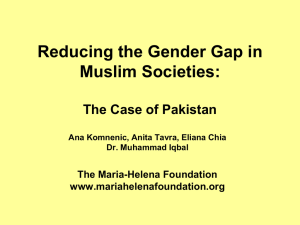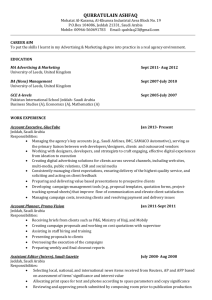Conference booklet with posters - School of Education
advertisement

School of Education FACULTY OF EDUCATION,SOCIAL SCIENCES AND LAW Research Students’ Annual Conference Posters (RSAC) 2013 9 May, University House, University of Leeds 2 Posters: Titles and Abstracts Khalid Al Tayyar The Department of Education University of York Job satisfaction and motivation amongst teachers in Saudi Arabia Introduction Several studies found that employees with high levels of job satisfaction were more likely to be productive, healthy and stable in employment (e.g., Knights & Willmott, 2007; Ellickson, 2002; Fox, Dwyer & Ganster, 1993). Most such studies were conducted in developed countries. There is a need for similar research in developing countries (Zembylas & Papanastasiou, 2004). There appears to be no published or grey literature on job satisfaction and motivation in private and public sector teachers in Saudi Arabia. Study aims and research questions The main aim of the study was to explore male teachers’ job satisfaction and motivation in boys’ secondary schools in Saudi Arabia. The research questions are as follows: 1. What is the overall level of job satisfaction amongst secondary school teachers in Saudi Arabia? 2. What are the main factors of job satisfaction for secondary school teachers in Saudi Arabia? 3. What factors contribute to job satisfaction and dissatisfaction among the participants? 4. What is their general level of overall motivation? 5. Is there a relationship between general job satisfaction and motivation? 6. Do job satisfaction and motivation vary in terms of demographic variables such as age, qualifications, job grade, subject taught and training? Situation in Saudi Arabia: will present on graph Findings Regarding general job satisfaction and motivation, the results reveal that teachers displayed high levels of both, with overall mean scores of 3.58 and 3.75 respectively. Finally, the study found statistically significant differences in job satisfaction and motivation between teachers based on their qualifications, experience and subjects taught. 3 References Ellickson, M. C. (2002). Determinants of job satisfaction of municipal government employees. Public Personnel Management; 31, 3; ABI/INFORM Global pg.343. Fox, M. L., Dwyer, D. J., & Ganster, D. C. (1993). Effects of stressful job demands and control on physiological and attitudinal outcomes in a hospital setting. Academy of Management Journal, 36, 289-318. Knights, D., & Willmott, H. (2007). Introducing organisational behaviour and management. London, Thomson Learning. Zembylas, M., & Papanastasiou,E. (2004). Job satisfaction among school teachers in Cyprus. Journal of Education Adminstration, 4(3), 357-374. Ibrar Bhatt School of Education University of Leeds Left to their own devices: the impact of cyberspace on classroom literacy events Recent research on the literacies of adult learners has revealed that they can engage in a wide variety of sophisticated and complex literacy practices outside of their spheres of formal learning, and which do not usually have a place in curricular activities. Additionally, over the last fifteen years, the UK government has viewed information and communications technology (ICT) as a crucial component of its drive to improve educational standards in the further education (FE) sector. After colleges have invested so much into new ICT materials, it becomes important to address the effects they have on classroom literacy events. The new digital materials contribute to new sociomaterial arrangements in classrooms, exploration and elucidation of which is key to understanding the digital literacy practices which instantiate them. My research asks: what are these new sociomaterial arrangements? What types of literacy events arise from them? And how do learners use them to influence and leverage educational, social, and professional progress? Methods adopted are: institutional observations, multimodal recordings of literacy events in process, and interviews. Results at this stage of the study suggest that learners can readily tap in to and mobilise out-of-college literacy practices to support classroom activities; making their own unsolicited alterations of classroom literacy events through, among other things but most notably, the often surreptitious use of cyberspace in the FE classroom. 4 Melike Bulut School of Education University of Leeds Pre-service language teacher learning during the practicum This poster outlines the design of a proposed research study which sets out to investigate preservice language teacher learning during the practicum in a Bachelor’s degree English language teacher education programme at a state university in Turkey. The poster addresses the rationale, focus, methodology and the significance of the proposed research by raising what, why, how and so what questions. Arwa Gandeel School of Education University of Leeds The story of a first-year English language teacher: her beliefs and practices in teaching speaking To understand what teachers do in their classrooms we need to gain insight into the beliefs that help in shaping their work. Rana’s case study is one out of five case studies in my PhD Thesis. Rana is a novice English language teacher who teaches English language to female students in a Saudi University. She started working as a teacher after she gained her BA in English Language in 2011. Rana started her job with neither any formal teacher education nor sufficient teacher training. Rana’s case study includes five semi-structured interviews and three class observations. The first two interviews were conducted to learn more about Rana’s background information and basic beliefs. Then, after each of the three class observations, a post-observation interview was conducted to gain deeper insights into her beliefs and to give her the opportunity to explain the rationale of her classroom teaching practice. This poster presents a summary of the beliefs and the practices of Rana’s beliefs and her speaking classroom teaching practices. 5 Chung Gilliland School of Education University of Leeds “You failed me”! Young learners in education system in Vietnam Vietnam is committed to an Education for All policy and has made primary education completely free since 1991, in order to bring all primary-school-aged children into school. After many years of trying, however, the government is confronting challenges relating to ethnic minorities, including: bringing children from ethnic minority groups to school; encouraging them not to drop out; heightening their academic achievement. My research aims to seek a better understanding of the learning situations of these children, to better understand any difficulties that directly or indirectly affect their learning in mainstream schools. After spending approximately one year in the field to collect data at a primary school that enrols a large number of ethnic minority children, I have come back from my research site with a rich source of data and I would like to share something that appeared to be significant in my findings – the pressures that young ethnic-minority learners are under in Vietnamese education system. Feedback and similar experience shared by my listeners today would add great value to my research I believe. Shanna Saubert School of Education University of Leeds What am I doing here? Exploring international student engagement and experiences Millions of students study outside their home countries every year. As a top destination for international students, the UK provides many opportunities to investigate the various factors which may affect the experiences of international students. While league tables compare universities based on various measures of student satisfaction, traditional surveys have not considered the impact of opportunities for students to learn and develop as individuals outside lecture halls and seminars. With multiple top-ranked programmes and a well-established students’ union, students are actively encouraged to “Love your time at Leeds”. In fact, over 7000 international students from 145 different countries contributed to a vibrant community of more than 33,000 students at the University of Leeds in 2011. Potential implications are widespread as students inevitably return 6 home and tell others about their once-in-a-lifetime experiences. Previous research has shown those students who participate regularly in on-campus activities with other students may express fewer problems adjusting and higher levels of satisfaction. After all, an important dimension of international education experiences is that students travel not just for academic qualifications but also to gain personal knowledge and experience of other cultures. Using mixed methods, current doctoral research explores the experiences of international students from the student perspective. For the purposes of this research, student engagement encompasses such diverse aspects as academic studies, social interactions, and other personal connections with both the university and wider communities. Leena Alfarani School of Education University of Leeds Exploring the influences of the Faculty adoption of mobile technology at King Abdulaziz Univerity, Saudi Arabia The growth of the internet and mobile technologies has enabled institutions of higher education to exploit mobile technology in order to take advantage of its wide potentials and keep up with the era of mobile approaches. One of the immediate results of this growth in mobile phone technology is that faculty members at universities are increasingly expected to teach by using this technology in order to improve education and change the style of traditional teaching, particularly, in developing countries. The main objective of this study is to better understand the acceptance or rejection of faculty members of mobile learning technology in Saudi higher education. This research examines the initiative of the adoption of mobile technology by measuring the degree of acceptance or reluctance the faculty members of mobile computing devices. The critical factors from the Unified Theory of Acceptance and Use of Technology (UTAUT; Venkatesh et al., 2003) and Division Innovation Theory (Rogers, 2003) and the extended constructs (Resistance to change) that affect the acceptance of ML will be tested in this study. Therefore, this case study uses a triangulation or mixed philosophical approach. A mixed methods approach is selected because “the combination of quantitative and qualitative approaches provides a better understanding of research problems than either approach alone” (Creswell et al., 2007, p.8). A combination of quantitative and qualitative research will be conducted via questionnaires and interviews with groups of lecturers at King Abdulaziz University. After analyzing the survey and the data collected during the quantitative phase, synchronous online semi-structured interviews will be conducted. 7






